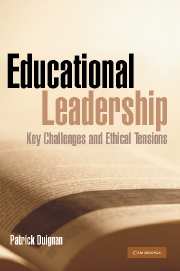Book contents
- Frontmatter
- Contents
- Acknowledgements
- Introduction and overview
- 1 Contemporary leaders and leadership under the spotlight
- 2 Key challenges for educational leaders
- 3 Leadership challenges as tensions
- 4 A framework for analysing tensions
- 5 Values and ethics in decision-making
- 6 A method for ethical decision-making
- 7 Shared and distributed leadership in schools
- 8 Why we need capable educational leaders
- 9 Why we need authentic educational leaders
- 10 Forming capable and authentic educational leaders
- References
- Index
8 - Why we need capable educational leaders
Published online by Cambridge University Press: 05 June 2012
- Frontmatter
- Contents
- Acknowledgements
- Introduction and overview
- 1 Contemporary leaders and leadership under the spotlight
- 2 Key challenges for educational leaders
- 3 Leadership challenges as tensions
- 4 A framework for analysing tensions
- 5 Values and ethics in decision-making
- 6 A method for ethical decision-making
- 7 Shared and distributed leadership in schools
- 8 Why we need capable educational leaders
- 9 Why we need authentic educational leaders
- 10 Forming capable and authentic educational leaders
- References
- Index
Summary
The discussion in chapter 1 pointed out that education systems and schools are constantly changing to adapt to pressure from the globalisation of technology, information and knowledge. As well, the discussion in chapters 2 and 3 highlighted the nature of the challenges and tensions facing many contemporary educational leaders. A key point in this chapter is that educational leaders need to develop their leadership capabilities if they hope to lead wisely, effectively and ethically in uncertain times.
Educational leaders, to be credible, have to be capable human beings as well as capable professional educators. They will need to be good managers and efficient, competent and productive practitioners but they must also be capable human beings because ‘it is not a matter of knowing something, but becoming someone, not just a matter of knowing relevant things, but of becoming a relevant person’ (Kelly, 2000, p. 19).
To be capable as human beings and as educators, educational leaders must use their knowledge, skills and competencies confidently, with good judgement and wisdom, in challenging and rapidly changing circumstances. The development of wisdom and good judgement cannot only be dependent upon competency training and development, which is currently the case for educational leaders, especially principals, in many education systems. It is argued in this chapter that knowledge acquisition and training in competencies may be inadequate as a basis for developing educational leaders for the future.
- Type
- Chapter
- Information
- Educational LeadershipKey Challenges and Ethical Tensions, pp. 116 - 126Publisher: Cambridge University PressPrint publication year: 2007



